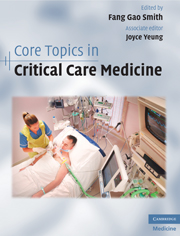Book contents
- Core Topics in Critical Care Medicine
- Core Topics in Critical Care Medicine
- Copyright page
- Contents
- Contributors
- Foreword
- Preface
- Acknowledgements
- Abbreviations
- Section I: Specific features of critical care medicine
- Section II: Systemic disorders and management
- Section III: Organ dysfunction and management
- Chapter 23 Bleeding and clotting disorders
- Chapter 24 Acute coronary syndromes
- Chapter 25 Cardiac arrhythmias
- Chapter 26 Acute heart failure
- Chapter 27 Mechanical ventilation
- Chapter 28 Failure of ventilation
- Chapter 29 Failure of oxygenation
- Chapter 30 Respiratory weaning
- Chapter 31 Non-invasive ventilation
- Chapter 32 Unconventional strategies for respiratory support
- Chapter 33 Acute gastrointestinal bleeding and perforation
- Chapter 34 Severe acute pancreatitis
- Chapter 35 Poisoning
- Chapter 36 Liver failure
- Chapter 37 Acute renal failure
- Chapter 38 Renal replacement therapy
- Chapter 39 Status epilepticus
- Chapter 40 Abnormal levels of consciousness
- Chapter 41 Meningitis and encephalitis
- Chapter 42 Traumatic brain injury
- Chapter 43 Trauma and burns
- Chapter 44 Eclampsia and pre-eclampsia
- Chapter 45 Obstetric emergencies in the ICU
- Chapter 46 Paediatric emergencies
- Section IV: Examinations
- Index
Chapter 42 - Traumatic brain injury
from Section III: - Organ dysfunction and management
Published online by Cambridge University Press: 06 July 2010
- Core Topics in Critical Care Medicine
- Core Topics in Critical Care Medicine
- Copyright page
- Contents
- Contributors
- Foreword
- Preface
- Acknowledgements
- Abbreviations
- Section I: Specific features of critical care medicine
- Section II: Systemic disorders and management
- Section III: Organ dysfunction and management
- Chapter 23 Bleeding and clotting disorders
- Chapter 24 Acute coronary syndromes
- Chapter 25 Cardiac arrhythmias
- Chapter 26 Acute heart failure
- Chapter 27 Mechanical ventilation
- Chapter 28 Failure of ventilation
- Chapter 29 Failure of oxygenation
- Chapter 30 Respiratory weaning
- Chapter 31 Non-invasive ventilation
- Chapter 32 Unconventional strategies for respiratory support
- Chapter 33 Acute gastrointestinal bleeding and perforation
- Chapter 34 Severe acute pancreatitis
- Chapter 35 Poisoning
- Chapter 36 Liver failure
- Chapter 37 Acute renal failure
- Chapter 38 Renal replacement therapy
- Chapter 39 Status epilepticus
- Chapter 40 Abnormal levels of consciousness
- Chapter 41 Meningitis and encephalitis
- Chapter 42 Traumatic brain injury
- Chapter 43 Trauma and burns
- Chapter 44 Eclampsia and pre-eclampsia
- Chapter 45 Obstetric emergencies in the ICU
- Chapter 46 Paediatric emergencies
- Section IV: Examinations
- Index
Summary
Keywords
- Type
- Chapter
- Information
- Core Topics in Critical Care Medicine , pp. 325 - 333Publisher: Cambridge University PressPrint publication year: 2010



